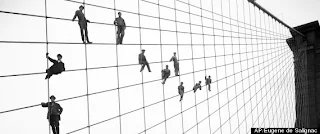Big news on the drive to work today! The New York City Department of Records has released a
gallery of over 800,000 images and audio from the Municipal Archives, including glass-plate crime-scene photos from the NYC Police Department. Free and open access makes this historic resource a great tool for researchers in many subject areas ... history, political science, art, criminal justice, sociology, and others.
 |
In Oct. 7, 1914, painters are suspended from wires on the
Brooklyn Bridge in New York. Photo provided by the
New York City Municipal Archives |
The link the the Gallery went live today after being up quietly for two weeks. It contains digital artifacts from as far back as the mid-1800s. Links to the gallery can be found on the Web Resources pages of the
Library's website. Let us know what you think!
